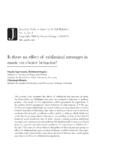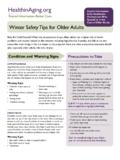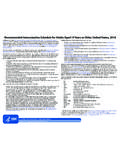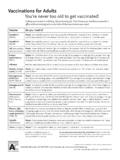Transcription of Training Skills of Divided Attention among Older …
1 61 Training Skills of Divided attentionTraining Skills of Divided Attention among Older Adults Ilmiye Se er Department of Psychology, Eastern Mediterranean University, North CyprusLata SatyenSchool of Psychology, Deakin University, Australia The current study examined whether video game Training would help improve Divided Attention Skills among Older adults. Twenty-nine (4 males, 25 females) participants aged 50 to 84 years (M = 70) were tested for their Skills of Divided Attention using a memory and reaction time task. Participants were randomly allocated to the experimental group and control group and only those in the experimental group trained with the computer game, Pac-Man Adventures in Time for three hours. Results show that three hours of Training are not sufficient to enhance Skills of Divided Attention amongst Older adults as the differences in these Skills were not significantly different between control and experimental groups.
2 These findings suggest that greater amounts or other methods of Training may be required to enhance Older adults ability to perform dual tasks. Journal of Articles in Support of the Null HypothesisVol. 9, No. 2 Copyright 2013 by Reysen Group. author:Ilmiye Se er, Department of Psychology, Eastern Mediterranean University, Magusa, North Cyprus,Mersin 10 : would like to thank Ulrike Lerner for comments/reviews on a draft version of the manuscript. Journal of Articles in Support of the Null Hypothesis. JASNH, 2013, Vol. 9, No. 262 Skills of Divided Attention can be defined as the ability to simultaneously attend to more than one activity (McDowd & Craik, 1988). These Skills are required for occupations or tasks that demand Skills in attending to several simultaneously occurring stimuli which include flying (Gopher, 1992; Gopher, Weil, & Bareket, 1994) and surgical skill (Rosser et al.)
3 , 2004). They are also required for the performance of a number of everyday activities such as walking (Bootsma van der Wiel et al., 2003; Mezler & Oddsson, 2004) and driving (Howard & Connell, 2005; McKnight, 2003) which are crucial, in particular for Older adults to maintain their independence (Fricke & Unsworth, 2001). However, research has shown that the ability to perform concurrent tasks decline with age (Craik & McDowd, 1987; McDowd & Craik, 1988). It is therefore important to investigate ways to enhance Skills of Divided Attention among Older adults. Theories such as the resource allocation theory (Kahneman, 1973) explain that there is a unitary pool of resources or Attention that needs to be Divided among multiple tasks and when the demand exceeds the available resources, performance on either one or both tasks declines.
4 Furthermore, the attentional resources theory states that the number of available attentional resources declines in old age (Craik, & Byrd, 1982; Craik, 1986; McDowd & Craik, 1988); consequently, they retain fewer attentional resources which they can allocate to dual tasks, which lead to a decrement in the performance of either one or both of the Task Performance among Older Adults Age related differences in dual task performance have been documented by a number of studies (Gother, Oberauer, & Kliegl, 2007; Sit & Fisk, 1999; Voelcker-Rehage & Alberts, 2007) using various dual task paradigms. Nevertheless, the recurrent finding in recent years has been that Older adults can improve their dual task performance given appropriate Training (Bherer et al.)
5 , 2006; Maquestiaux et al., 2004). These findings are similar to those of younger adults who showed improvement in dual task performance after practice (Oberauer & Kliegl, 2004). In spite of this, studies have indicated that dual task costs remain for Older adults (Rogers, Bertus, & Gilbert, 1994). These findings suggest that Older adults executive system functions remain in a serial processing constraint even after extensive practice (Gother et al., 2007). This consequently hinders the effective coordination of concurrent tasks (McDowd, 1986). It is possible that Older adults require further Training to eliminate dual task costs (Gother et al., 2007). Improving Dual-Task Performance Though Practice A review of the literature has revealed that the amount of practice provided is crucial in determining the elimination of age related dual task costs (Rogers et al.
6 , 1994). For example, Baron and Mattila (1989) and Wickens, Braune, and Stokes (1987) found that age related dual task costs could be eliminated after 11,800 trials of memory scanning practice or three sessions ( hours) of practice, respectively. Furthermore, the ability to automatise a task allowing it to require fewer attentional resources is equally important in eliminating dual task costs among Older adults. Despite this, the extant literature has revealed limited research investigating strategies to improve such Skills among Older adults. It is therefore necessary to investigate effective methods to enhance Older peoples Divided Attention Skills of Divided attentionImproving Cognitive Skills through Video Game Training A method of Training which could benefit the development of Divided Attention Skills is video game Training .
7 Recent investigations have shown that video game play has many positive effects on a range of cognitive Skills including spatial Skills (Okagaki & Frensch, 1994), visual Attention Skills (Dye & Bavelier, 2004; Dye, Green, & Bavelier, 2009; Green & Bavelier, 2003) and reaction time performance (Clark, Lanphear, & Riddick, 1987; Dustman, Emmerson, Steinhaus, Shearer, & Dustman, 1992; Goldstein et al., 1997) among children, adolescents, and Older adults. Video game Training could also benefit the development of Divided Attention (Greenfield, DeWinstanley, Kilpatrick, & Kaye, 1994; Satyen, 2003) because video games require consistent monitoring of several concurrent targets appearing at several locations on a video screen (Gagnon, 1985) as well as controlling different buttons on the controller or keyboard.
8 In spite of the above findings which indicate that visual and attentional Skills can be enhanced via video game Training , Boot, Kramer, Simons, Fabiani, and Gratton (2008) have shown that these Skills cannot be improved through such Training . Boot et al. (2008) have indicated that greater amounts of Training may be required for non video game players to show the same beneficial effects observed in expert video game players. Furthermore, a study by Murphy and Spencer (2009) has been unable to replicate findings of past studies ( , Dye & Bavelier, 2004; Dye et al., 2009; Green & Bavelier, 2003) which show an enhancement of visual Attention following video game Training . Similarly, the findings by Owen et al. (2010) revealed that after a minimum of 10 minutes a day, three times a week (for six weeks) of computerised brain Training no improvements were observed in general cognitive abilities such memory, Attention or visuospatial Skills .
9 These findings suggest that video games may have a limited role in modifying cognitive Skills such as Attention . Otherwise, as Basak, Boot, Voss, and Kramer (2008) have indicated extensive Training may be needed before cognitive skill can be improved. Hence, the contrary findings in relation to whether video game Training is effective in enhancing attentional capacity warrant the need for further research. According to Boot, Blakely, and Simons (2011) one reason for the controversial findings in relation to whether or not video game Training is effective in enhancing cognition could be caused by methodological shortcomings. Boot et al. (2011) explain that observed gaming benefits on cognition could simply be a result of participants expectations and motivations about their gaming experience.
10 Boot et al. (2011) thus express the need for more experimental design studies ( , Training experiments) to avoid methodological limitations, such as the placebo effect, when investigating for any cause and effect relationships of video game Training and cognitive improvement. Recent research has shown that playing online games can transfer acquired Skills to untrained measures of executive functioning such as inhibition and inductive reasoning (Muijden, Band, & Hommel, 2012). Similarly, Karbach and Kray (2009) demonstrated transfer to other untrained measures of executive tasks such as the Stroop Test following task switching Training among Older adults. Such findings are important for Older adults given the implications of transfer effects of cognitive Skills to tasks of everyday living.










